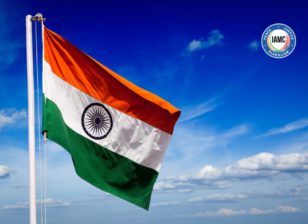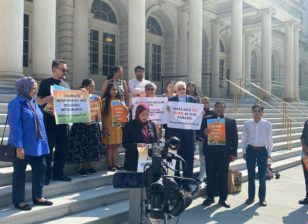Court order allowing Hindus to worship inside historic Gyanvapi Mosque condemned by Indian Americans
Washington, DC (January 31, 2024) – The Indian American Muslim Council (IAMC), an advocacy group dedicated to safeguarding India’s pluralist and tolerant ethos, today strongly condemned the order of a court in Uttar Pradesh state to allow Hindu devotees to worship in the basement of Varanasi’s historic Gyanvapi Mosque.
On Monday, the court directed the district administration to make arrangements to start the “puja (worship)” within seven days. This order comes a week after the consecration of the “Ram Temple” built on the site of the demolished Babri mosque.
This verdict echoes the troubling parallels seen in the Babri Masjid case. We vehemently stand against any effort to erase our history and heritage, as well as the manipulation of religious narratives for political ends. By aligning with Hindu extremist groups and advancing their majoritarian agenda, this court decision represents a significant injustice and constitutes another assault on the rights of India’s 200 million Muslims,” said IAMC Executive Director Rasheed Ahmed.
The court order comes nearly 20 months after the court’s earlier directive instructing authorities to seal a section of the Gyanvapi mosque. This directive followed a survey conducted by lawyer commissioner Ajay Kumar Mishra, appointed by the court after a group of Hindu women filed a petition seeking permission to pray on the premises. Mishra reported to the court that a Shiva Linga (an idol depicting the Hindu deity Shiva) was discovered in the mosque’s wazu khana (ablution tank).
The legal representatives of the Anjuman Intezamia Masjid Committee, responsible for overseeing the Gyanvapi mosque, have refuted the assertion, stating that the object in question is not a “shivling” but rather a component of a fountain.
The latest court order completely violates the 1991 Places of Worship (Special Provisions) Act, which prohibits the conversion of places of worship from one religion to another, except for the Babri Masjid dispute.
The Babri Masjid was demolished in 1992 by a Hindu extremist mob who claimed — without evidence — that the Mughal-era mosque had been constructed on land holy to Hindus. The mob was made up of 150,000 people, led by Hindu supremacists belonging to the paramilitary RSS, the BJP, the extremist Vishwa Hindu Parishad (VHP), and Bajrang Dal.
Shockingly, India’s Supreme Court awarded that land to the Hindus even while acknowledging that no evidence existed that the mosque had been built by demolishing a temple and also ruling that its demolition was a criminal act.
“The failure of the courts to safeguard Muslim places of worship and deliver justice for the criminal demolition of the Babri Masjid highlights a disconcerting state of the Indian judiciary with overt Hindu nationalist overtones,” said IAMC President Mohammad Jawad.
“The judiciary must operate free from any biases, upholding the principles of justice, religious harmony, and the protection of minority rights,” Jawad added.




